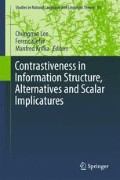Abstract
The quantificational system in Japanese makes use of so-called indeterminate pronouns, which take on existential, universal, interrogative, negative polarity, or free choice interpretations depending on what operator they associate with. Similar systems are found crosslinguistically, which raises the question as to what makes such system look so different from more familiar determiner quantification systems. This paper takes a first step toward answering this question by presenting an analysis of the German indeterminate pronoun or determiner irgendein from a Japanese point of view.
This paper was written in 2002 and has circulated through Semantics Archive. It appears here unchanged, except for some minor editorial changes. A slightly shorter version of this paper appeared in Yukio Otsu (ed.): The Proceedings of the Third Tokyo Conference on Psycholinguistics. Tokyo (Hituzi Syobo), 2002, 1–25. We would like to thank the audiences at the 13th Amsterdam Colloquium, the Third Tokyo Conference on Psycholinguistics, UCLA and UMass Amherst for helpful comments.
Access this chapter
Tax calculation will be finalised at checkout
Purchases are for personal use only
Notes
- 1.
Thanks to Akira Watanabe for bringing to our attention the fact that Japanese lacks a quantificational particle meaning most that takes indeterminate phrases. Here is how ‘most’ is expressed in Japanese (the ‘floated’ versions are also possible). NO = pre-nominal modification marker.

Watanabe pointed out that the question of whether the above fact is an accident in Japanese, or it holds across languages that has Japanese-type systematic indeterminate phrase quantification, should have consequences in the validity of the claim that determiner quantification is reduced to a special case.
- 2.
There should be a choice for the world index with respect to which α is to be evaluated in (i) to (iv), an issue we will neglect here and below.
- 3.
There is a question about the correctness of the definition for Predicate Abstraction. It does not quite deliver the expected set of functions. As far as we can see, however, no wrong predictions are actually made, as long as we only use the definition for generating propositional alternatives.
- 4.
Examples (5) and (6) are due to Haspelmath (1997).
- 5.
Example (7) is from the Akademiegrammatik (1981), p. 667 f.
- 6.
There is some discussion in Groenendijk and Stokhof’s and Zimmermann’s work concerning the status of exhaustivity inferences. Staying agnostic with respect to this issue, we are using the neutral term “inference”.
- 7.
In (18), auf keinen Fall was chosen, since irgendein can’t be in the scope of sentential negation.
- 8.
If irgend is stressed, you get the reading ‘I didn’t read just ANYthing.’
- 9.
References
Autorenkollektiv. 1981. Grundzüge einer deutschen Grammatik. Berlin: Akademieverlag.
Beck, Sigrid. 1996. Quantified structures as barriers for LF movement. Natural Language Semantics 4(1): 1–56.
Chierchia, Gennaro. 2001. Scalar Implicatures, Polarity Phenomena, and the Syntax/Pragmatics Interface. Manuscript, University of Milan, Bicocca.
Chomsky, Noam. 1995. The minimalist program. Cambridge, MA: The MIT Press.
Dayal, Veneeta. 1998. Any as inherently modal. Linguistics and Philosophy 21(5): 433–476.
Gazdar, Gerald. 1979. Pragmatics. New York: Academic Press.
Giannakidou, Anastasia. 2001. The meaning of free choice. Linguistics and Philosophy 24: 659–735.
Groenendijk, Jeroen, Martin, Stokhof. 1984. Studies on the semantics of questions and the pragmatics of answers. Universiteit van Amsterdam Ph.D. Dissertation.
Hagstrom, Paul A. 1998. Decomposing questions. MIT Ph.D. Dissertation.
Hamblin, Charles L. 1973. Questions in montague English. Foundations of Language 10: 41–53.
Haspelmath, Martin. 1997. Indefinite pronouns. Oxford: Oxford University Press.
Heim, Irene. 1982. The Semantics of Definite and Indefinite Noun Phrases. UMass Ph.D. Dissertation.
Horn, Laurence R. 1989. A natural history of negation. Chicago: Chicago University Press.
Kadmon, Nirit, Fred, Landman. 1993. Any. Linguistics & Philosophy 16: 353–422.
Kamp, Hans. 1984. A theory of truth and semantic representation. In Truth, interpretation, and information, ed. J. Groenendijk, T. Janssen, and M. Stokhof, 1–41. Dordrecht: Foris.
Krifka, Manfred. 1994. Some remarks on polarity items. In Semantic universals and universal semantics, ed. D. Zaefferer, 150–189. Dordrecht: Foris.
Krifka, Manfred. 1995. The semantics and pragmatics of polarity items. Linguistic Analysis 25(3–4): 209–257.
Kuroda, S.-Y. 1965. Generative grammatical studies in the Japanese language. MIT Ph.D. Dissertation.
Lahiri, Utpal. 1998. Focus and negative polarity in Hindi. Natural Language Semantics 6(1): 57–123.
Lee, Young-Suk, Laurence, Horn. 1994. Any as Indefinite plus Even. Manuscript, Yale University
Matthewson, Lisa. 2001. Quantification and the nature of crosslinguistic variation. Natural Language Semantics 9(2): 145–189.
Nishigauchi, Taisuke. 1986. Quantification in syntax. UMass Ph.D. Dissertation.
Nishigauchi, Taisuke. 1990. Quantification in the theory of grammar. Dordrecht: Kluwer.
Ohno, Yutaka. 1989 Mo. In: Papers on quantification, NSF Grant Report, Department of Linguistics, UMass, Amherst, GLSA Amherst, eds. E. Bach, A. Kratzer and B. H. Partee, 224–250.
Pesetsky, David. 2000. Phrasal movement and its kin. Cambridge/Mass: The MIT Press.
Ramchand, Gillian C. 1997. Questions, polarity, and alternative semantics. Proceedings of NELS 27, GLSA Amherst, 383–396.
Saebø, Kjell Johan. 2001. The semantics of Scandinavian free choice items. Linguistics and Philosophy 24: 737–787.
Schwarzschild, Roger. 2000. Singleton indefinites. Manuscript, Rutgers University
Shimoyama, Junko. 1999. Complex NPs and Wh-quantifiers in Japanese. Proceedings of NELS 29, GLSA Amherst, 355–385.
Shimoyama, Junko. 2001. Wh-constructions in Japanese. UMass Ph.D. Dissertation.
von Stechow, Arnim. 1996. Against LF pied-piping. Natural Language Semantics 4(1): 57–110.
Zimmermann, Thomas Ede. 2000. Free choice disjunction and epistemic possibility. Natural Language Semantics 8: 255–290.
Author information
Authors and Affiliations
Corresponding author
Editor information
Editors and Affiliations
Rights and permissions
Copyright information
© 2017 Springer International Publishing Switzerland
About this chapter
Cite this chapter
Kratzer, A., Shimoyama, J. (2017). Indeterminate Pronouns: The View from Japanese. In: Lee, C., Kiefer, F., Krifka, M. (eds) Contrastiveness in Information Structure, Alternatives and Scalar Implicatures. Studies in Natural Language and Linguistic Theory, vol 91. Springer, Cham. https://doi.org/10.1007/978-3-319-10106-4_7
Download citation
DOI: https://doi.org/10.1007/978-3-319-10106-4_7
Published:
Publisher Name: Springer, Cham
Print ISBN: 978-3-319-10105-7
Online ISBN: 978-3-319-10106-4
eBook Packages: Social SciencesSocial Sciences (R0)


